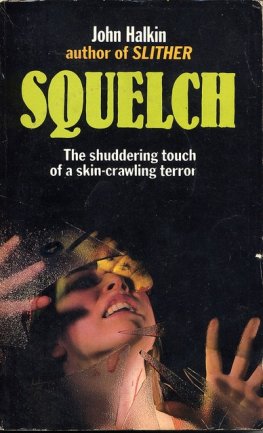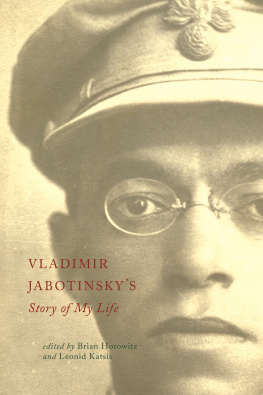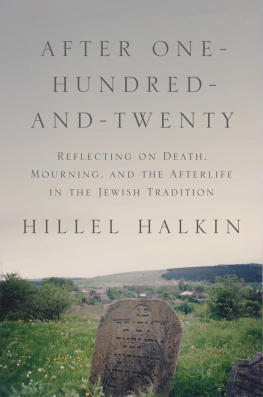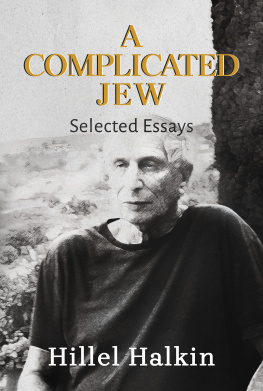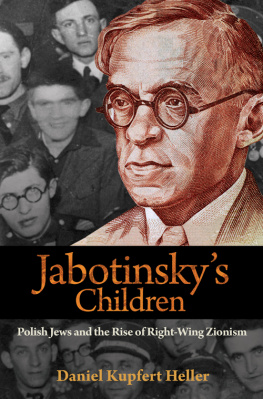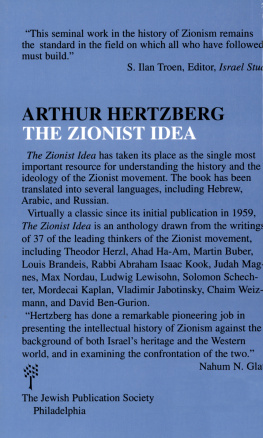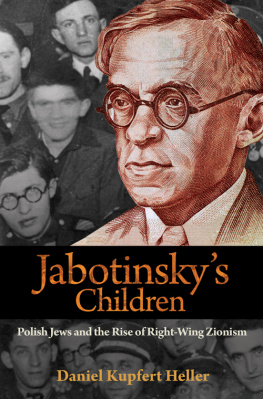JABOTINSKY

Jabotinsky
A Life
HILLEL HALKIN

Frontispiece: Jabotinsky in 1918. Courtesy of the Jabotinsky Institute in Israel.
Copyright 2014 by Hillel Halkin.
All rights reserved.
This book may not be reproduced, in whole or in part, including illustrations, in any form (beyond that copying permitted by Sections 107 and 108 of the U.S. Copyright Law and except by reviewers for the public press), without written permission from the publishers.
Yale University Press books may be purchased in quantity for educational, business, or promotional use. For information, please e-mail sales.press@yale.edu (U.S. office) or sales@yaleup.co.uk (U.K. office).
Set in Janson Oldstyle type byTseng Information Systems, Inc. Printed in the United States of America.
Library of Congress Cataloging-in-Publication Data
Halkin, Hillel, 1939
Jabotinsky : a life / Hillel Halkin pages cm (Jewish Lives)
Includes bibliographical references and index.
ISBN 978-0-300-13662-3 (alk. paper)
1. Jabotinsky, Vladimir, 18801940. 2. Revisionist Zionists
Biography. 3. ZionismBiography. I. Title.
DS151.Z5.H36 2014
320.54095694092dc23
[B] 2013041102
A catalogue record for this book is available from the British Library.
This paper meets the requirements of ANSI/NISO Z39.48-1992
(Permanence of Paper).
10 9 8 7 6 5 4 3 2 1
CONTENTS
1
The Young Jabotinsky
ALTHOUGH THE LONDONSKAYA in Odessa was the most palatial hotel my wife and I had ever stayed in, our room was a simple one on the top floor, where the servants quarters once were. The grand suites started on the floor below, past which the elevator didnt go. To reach it we had to circumnavigate a long, dark hallway and climb down a narrow flight of stairs. Only then did we emerge in the broad corridors with their high, carved wooden doors, chandeliered ceilings, elaborate parquet floors, stained-glass windows, and great carpeted stairway sweeping down to the lobby as though for a Tsarina to descend on to a ball.
It wasnt all genuinely Tsarist. Built in 1827, the London-skaya was extensively renovated at the start of this century after falling into disrepair during the long years of Communist rule. So was the entire old center of Odessa, which was founded in 1794 by Catherine the Great, on territory wrested from the Turks, to be Russias Black Sea gateway to the world. Set on a flat promontory overlooking a gulf into which empty three of Europes greatest rivers, the Danube, the Dniester, and the Dnieper, its once-again stately streets with their languorous namesPushkinskaya, Longeronovskaya, Richelievskaya, Yekaterinskaya, Deribasovskayaabut a strip of leafy greenery sloping down to a busy port. A few hundred yards to the Londonskayas left, at the foot of a commanding statue of Odessas second governor, Duke Armand de Richelieu, dressed in the toga of a Roman senator, the slope is cut by Odessas famed boulevard of stairs. Their nearly two hundred broad steps were made an icon of the city by Sergei Eisensteins Soviet-era film The Battleship Potemkin with its melodramatic scene of troops firing, during the 1905 anti-Tsarist uprising, on a crowd of demonstrators that flees, falls, and tumbles down them, followed by a sleeping baby in a runaway carriage.
Farther away from the water, past Cathedral Square and its neoclassical Church of the Incarnation, renovated Odessa comes to an end and leaves the rest of the city still moldering. Its all a big show, we were warned in advance by an ex-Odessan in Israel. Still, its a fine show, especially if youve come to it on the trail of Vladimir Jabotinsky, the great Zionist politician and writer who was born in Odessa in 1880. Although Jabotinsky left Odessa when he was seventeen, lived in it only intermittently thereafter, and said a last goodbye to it before World War I, a part of him always remained thereand what remained in him of it, the city he grew up in, studied in as a boy, worked in as a young journalist, and wrote his wonderful novel The Five about, was either in or just beyond the elegant downtown above the sea now restored to its former architectural glory.
A gift of the sea is what the most gorgeous of its creations, Odessas opera house and municipal theater, looks like. One of the first buildings you come to if you turn away from Richelieu upon leaving the Londonskaya and head in the opposite direction, its curving, sand-colored walls and conch-white pillars and porticos suggest a great, intricately whorled seashell. The story is told, tempting to believe, that its Italian construction workers sang arias as they laid and plastered its bricks. Unable to get a glimpse of its interior, I had to content myself with a description by The Fives narrator, a young journalist attending a performance of the opera Mona Vanna, of its blazing crystal, gilt, caryatids, and red velvet chairs that reflected all the splendor of our carefree, contented Odessa.
Carefree, contented Odessa! Never mind that by The Fives end the city has become a bubbling stew of popular discontent, rising ethnic tensions, and that fumy mixture of decadence and revolutionary ferment that heralds the explosive ends of epochs. While this was the Odessa that Jabotinsky said farewell to and that helped make him an active Zionist, the Odessa he looked back on nostalgically was a lighter-hearted place. A gneyvishe shtot, a thievish city, he once called it, using a Yiddish expression that meant not only that it was a freewheeling town in which one had to survive by ones wits, but that its roguishness stole ones affections. Nowhere, he wrote in his memoirs, but in Odessathat is, in the Odessa of those yearswas the air ever so full of soft gaiety and light intoxication, without the slightest hint of psychological complications.world. I have friends and acquaintances from many places [in Russia], Jabotinsky remarked,
and I have often heard them speak of their formative years and felt (Im referring to the Jews among them) that they grew up in an atmosphere thick with the grimness and bitter salt of Jewish tragedy.... Perhaps Jewish society in such places was more deeply and consciously Jewish and far better educated in Jewish terms. Yet Ive always thought that in their psyches, from childhood on, these Jews lived in a harsh climate, under gray skiesalways in a state of war in which they had to fight their way forward while defending themselves against countless enemies. This may have been, I admit, a better training ground for a Jewish existence; it created more profound, perhaps more finely attuned types. Odessa was never profound about anythingbut for that reason it never pecked at the soul. Having no traditions, it didnt fear new ways of life or doing things. This made us Jews more temperamental and less hungry for success; more cynical, but not so bitter.
Odessa was indeed a unique place for nineteenth-century Russian Jews, the only large Russian city they werent barred from. For Jewish inhabitants of the Pale of Settlement, the extensive area of rural western Russia to which they were legally confined after its acquisition by the Tsarist empire in the 1772, 1793, and 1795 partitions of Poland, cities like Moscow, St. Petersburg, and Kiev were out-of-bounds; special permits, obtainable only by a limited number of wealthy or professionally trained Jews, were needed to live in them. Newly established Odessa, to which the Russian government sought to attract settlers, was the exception. Drawn by its boom-town economy, Jews flocked to it. By 1850 there were more than fifteen thousand of them, comprising twenty percent of the citys residents and over fifty percent of its merchant class; thirty years later, they were a quarter of a population that had swelled to three hundred thousand. A main street was named Yevreskaya or Jews Street, and living like God in Odessa was a proverbial Jewish way of saying living high. The impressions of a provincial Jew arriving in the city for the first time are conveyed in a letter sent home to his wife by Sholem Aleichems comic fictional character Menachem-Mendl, who has gone to Odessa to seek his fortune. Words fail me, he writes,
Next page


